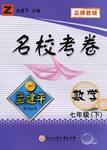
【题目】阅读下面的文字,回答问题。
念奴娇·赤壁怀古
苏轼
大江东去,浪淘尽,千古风流人物。故垒西边,人道是,三国周郎赤壁。乱石穿空,惊涛拍岸,卷起千堆雪。江山如画,一时多少豪杰。
遥想公瑾当年,小乔初嫁了,雄姿英发。羽扇纶巾,谈笑间,樯橹灰飞烟灭。故国神游,多情应笑我,早生华发。人生如梦,一尊还酹江月。
【1】这首词写了哪些景物?有何特点?有何作用?
【2】这首词的下阕集中笔墨怀人,在众多的风流人物中,作者为何仅写周瑜一人?
【3】简要分析这首词的主要艺术特色。
【4】这首词的上阕写景怀人,在众多的风流人物中,作者为什么把怀念的对象锁定为周瑜?
【5】下列对《念奴娇·赤壁怀古》的理解分析,不正确的一项是( )
A.起句写长江给人以雄奇壮丽之感,既写江景,又点明怀古,从大处落笔,气势磅礴,感情饱满。
B.“浪淘尽”三字,含蓄有力地表达了作者凭吊古战场的心情,也蕴含了“是非成败转头空”的意思。
C.“乱石穿空,惊涛拍岸,卷起千堆雪”十三字,从形、声、色三方面勾画了古战场的雄奇壮丽。
D.这首词在“怀古”的基础上“伤今”,词作最后回到现实,抒发自我的感伤,感情沉郁而又悲慨。
【答案】
【1】大江、故垒、乱石、惊涛、樯橹灰飞烟灭。景物特点:气势宏大、雄起壮丽。作用:将江山之胜和怀古之情融为一体。
【2】这首词是苏轼贬居黄州时所作,是借古事以抒怀。下阕由“遥想”领起,集中笔力塑造青年将领周瑜风姿潇洒、韶华似锦、年轻有为、运筹帷幄、决胜千里,而自己一生壮志难酬、华发早生、功业难就。在此对比中表达了词人的郁愤和感慨。
【3】(1)烘托:词中以“千古风流人物”引出赤壁之战时的“多少豪杰”,最后集中为周瑜一人。用众多的豪杰来烘托周瑜,突出周瑜在作者心目中的重要地位。
(2)映衬,词中有两种映衬:①实景与虚景映衬。作者亲眼所见的景象是实,作者想象的战争情景是虚,二者互相衬托。②周瑜的“雄姿英发”与作者的“早生华发”相互映衬,既显出周瑜的少年得志,又显出作者的壮志未酬。
【4】作者在千古风流人物中,把追怀的对象锁定在周瑜身上,不仅因为此地是三国赤壁之战的遗址,更因为作者怀有年老而无为、壮志不得施展的惆怅。这样自然而然地联想到年少而功成名就、意气风发的周瑜,使作者与周瑜形成鲜明的对比,表达作者英雄无奈的情感。
【5】B
【解析】
【1】鉴赏文学作品的形象、语言和表达技巧。能力层级为鉴赏评价D。
解答此类题目,重点是读懂诗句大意,然后就题目要求概括写了哪些景物,景物的特点,描写这些景物的作用。先回答前面具体的问题,然后再对其作用做总体概括。
【2】本题考查评价词作的思想内容和观点态度的能力。作者意在拿自己与周瑜比较,以显现出自己至今功业未成的忧愤。
【3】本题考查鉴赏文学作品的表达技巧。烘托与映衬是本文的主要特色,回答时一定要结合文本进行分析。
【4】此题考查对词的内容和主旨的理解能力。可以结合所写景物的地点和作者所要抒发的情感来思考。
【5】“浪淘尽”三字,没有蕴含“是非成败转头空”的意思,这是为下文“怀古”作铺垫,以表明自己对古人的追怀。


 孟建平名校考卷系列答案
孟建平名校考卷系列答案科目:高中地理 来源: 题型:
【题目】________ is no possibility ________Bob can win first prize in the contest.
There; that
It; that
There; whether
It; whether
查看答案和解析>>
科目:高中地理 来源: 题型:
【题目】—Shall we go for a drink at one o’clock this afternoon?
—_______. Will two o’clock be OK?
Sure, it’s up to you
Sure, no problem
Sorry, I can’t make it
Sorry, I’m not available today
查看答案和解析>>
科目:高中地理 来源: 题型:
【题目】She __________ a little money each week in order to fly to Hawaii to have a relaxing holiday.
A. sets aside
B. turns around
C. piles up
D. gives out
查看答案和解析>>
科目:高中地理 来源: 题型:
【题目】阅读下面这首宋词,完成各题。
定风波
苏轼
三月七日,沙湖道中遇雨。雨具先去,同行皆狼狈,余独不觉。已而遂晴,故作此。
莫听穿林打叶声,何妨吟啸且徐行。竹杖芒鞋轻胜马,谁怕?一蓑烟雨任平生。 料峭春风吹酒醒,微冷,山头斜照却相迎。回首向来萧瑟处,归去,也无风雨也无晴。
【1】下列对《定风波》一词的理解,不正确的一项是( )
A.这首词全篇即景抒情,语言自然流畅,蕴含着深刻的人生哲理,体现了东坡词独特的审美风格。
B.这首词借途中遇雨的生活小事,抒写作者苦乐随缘、开朗乐观、意存归隐的人生态度和坦荡胸怀。
C.“莫听”“何妨”两句是作者的人生写照,也是全词的主题,以下词情都是由此而发。
D.“一蓑烟雨任平生”“归去,也无风雨也无晴”两句,表达了词人乐观开朗、积极进取、对仕途风浪无所畏惧的精神。
【2】作者在另一首《独觉》诗中写道:“翛(xiāo,无拘无束,自由自在)然独觉午窗明,欲觉犹闻醉鼾声。回首向来萧瑟处,也无风雨也无晴”。诗的后两句与题中词的后两句大体相同,作者为什么独爱这两句?
查看答案和解析>>
科目:高中地理 来源: 题型:
【题目】John Perry stood up and looked around again. The island had been a good place to find shells. But now how could he make the move out to sea?If they swam out to sea he could jump in and get to shore they saw him.
He saw the sharks rolling and playing. Their
was now gone and they were killing for fun. How could he make them move away?
He drew his knife from his belt. Sharks can blood,he thought. He put the knife against his leg and cut deep into the The blood ran out and he caught it on his white shirt. When the shirt was red and wet he tied some cloth around his leg to the flow of blood. He then tied a long piece of cloth to the shirt, threw it into the water and it with the piece of cloth.
The sharks smelled the blood and came to-ward the shirt. He ran down the sand reef pulling the shirt and the sharks raced after it. He was them away from shore. Suddenly he dropped the cloth, turned toward the and ran as fast as he could. He jumped in the water and swam.
He was halfway across he turned to look back. A high bony fin (鳍)was
through the water toward him. He put his face in the water and kicked and splashed himself as fast as he could. The shore was near now.
He lifted his head again to and he saw the shore very near. From behind he felt the water rushing toward him, almost pushing him, helping him. And then a great gray body hit him and almost rolled him over in the water. He touched the shore with (15) and he pulled himself up the stones. The shark, by the smell of blood and the chase(追逐),went wildly after him. Its great body crashed against .
The end came quickly and the water was covered with the shark's blood. The injured shark was eaten up by others as it tried to escape.
Perry slowly struggled his feet.
“So,” he said, "you did not get me. ”And he looked down at the sharks still eating they weren't hungry. He climbed up the stones and walked toward the village.
【1】 A. boats B. sharks C. soldiers D. shells
【2】 A. before B. after C. until D. when
【3】 A. food B. hunger C. anger D. wish
【4】 A. fear B. taste C. drink D. smell
【5】A. sand B. shark C. flesh D. meat
【6】 A. stop B. keep C. join D. cause
【7】 A. pulled B. wrapped C. connected D. caught
【8】A. running B. racing C. swimming D. jumping
【9】A. driving B. keeping C. preventing D. leading
【10】 A. sea B. shore C. island D. sand
【11】A. before B. while C. unless D. when
【12】 A. going B. running C. cutting D. swimming
【13】 A. forward B. backward C. upward D. downward
【14】 A. cry B. breathe C. swim D.
【15】 A. his feet B. a stick C. his fingers D. the shirt
【16】 A. interested B. frightened C. disappointed D. excited
【17】 A. the shore B. Perry C. the stones D. the shells
【18】 A. lively B. alive C. dead D. friendly
【19】 A. on B. by C. to D. with
【20】 A. as though B. even though C. as soon as D. as long as
查看答案和解析>>
科目:高中地理 来源: 题型:
【题目】All the children were __________ moved by what Liao Bo had done in the earthquake.
A. deep
B. deeply
C. depth
D. depthly
查看答案和解析>>
科目:高中地理 来源: 题型:
【题目】__________ the city centre, we saw a stone statue of about 10 metres in height.
A. Approaching
B. Approached
C. To approach
D. To be approached
查看答案和解析>>
科目:高中地理 来源: 题型:
【题目】__________ to the sun for a long time will do harm to your skin.
A. Exposed
B. Exposing
C. Being exposed
D. To be exposed
查看答案和解析>>
湖北省互联网违法和不良信息举报平台 | 网上有害信息举报专区 | 电信诈骗举报专区 | 涉历史虚无主义有害信息举报专区 | 涉企侵权举报专区
违法和不良信息举报电话:027-86699610 举报邮箱:58377363@163.com